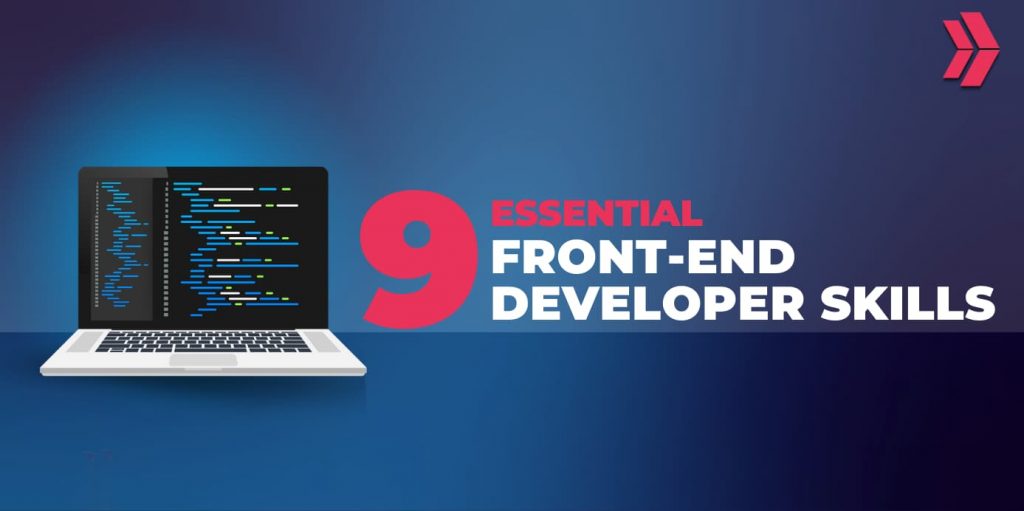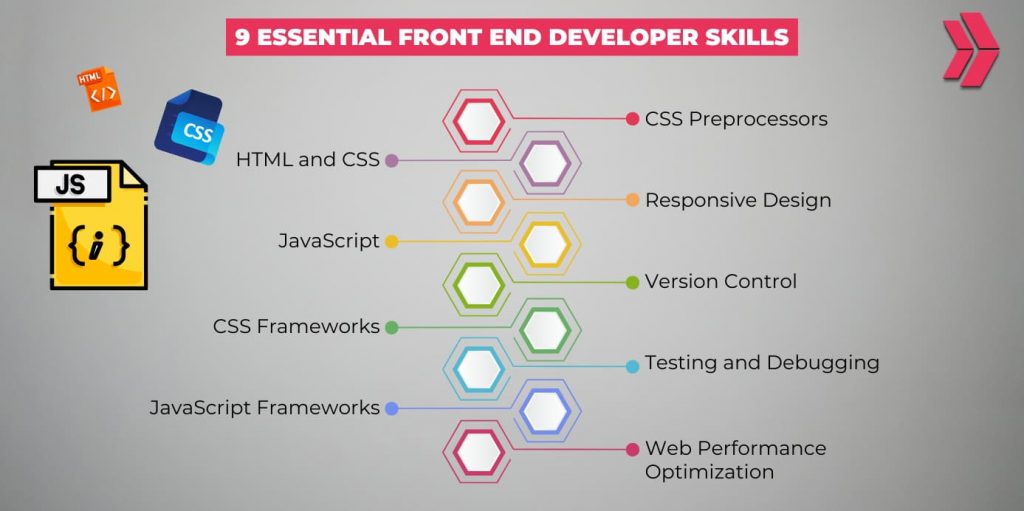Front-end development is one of the fastest-growing fields in the tech industry, with a projected 8% growth rate between 2023 and 2033, according to U.S. Bureau of Labor Statistics. This growth highlights the increasing demand for skilled professionals who can create user-friendly and visually appealing websites. To succeed as a front end developer, you need to understand the essential front end developer skills that ensure smooth functionality and great user experiences. Whether you’re just starting out or looking to improve, preparing with the right skills is key to excelling in this dynamic field.
This article will guide you through the nine essential skills you need to prepare for a rewarding career in front-end development.

What Does a Front-End Developer Do?
A front-end developer works on the user-facing side of websites and applications. They translate designs into functional interfaces and ensure a smooth user experience.
Key responsibilities of a front-end developer include:
- Building user interfaces using HTML, CSS, and JavaScript.
- Ensuring websites are responsive and work across all devices.
- Collaborating with backend developers to integrate functionality.
- Optimizing website performance for fast loading times.
- Testing and debugging to ensure error-free performance.
Front-end developers play a crucial role in making websites accessible, interactive, and visually engaging.
What are the 9 Essential Front End Developer Skills?
Here are the nine key skills every front-end developer should master:
- HTML and CSS
- JavaScript
- CSS Frameworks
- JavaScript Frameworks
- CSS Preprocessors
- Responsive Design
- Version Control
- Testing and Debugging
- Web Performance Optimization

1. HTML and CSS
HTML and CSS form the foundation of front-end development.
- HTML structures the content on web pages.
- CSS handles the design, including layouts, colors, and fonts.
These are the first tools you need to learn to start your front-end development journey.
2. JavaScript
JavaScript makes websites interactive and dynamic.
- It powers features like animations, dropdown menus, and real-time updates.
- Understanding JavaScript is essential for creating engaging user experiences.
3. CSS Frameworks
CSS frameworks simplify and speed up design tasks.
- Bootstrap: Ideal for building responsive websites with pre-designed components.
- Tailwind CSS: Focuses on utility-first design for customization.
Using frameworks helps create consistent and efficient layouts.
4. JavaScript Frameworks
JavaScript frameworks streamline the development of interactive applications.
- React: Popular for creating reusable UI components.
- Vue.js: Lightweight and easy to use for dynamic applications.
- Angular: Suitable for building complex, feature-rich web applications.
Frameworks allow developers to build scalable and maintainable applications.
5. CSS Preprocessors
CSS preprocessors like Sass and LESS add functionality to CSS.
- Use variables, nesting, and mixins for more efficient coding.
- Simplify styling tasks, especially in large projects.
6. Responsive Design
Websites must work on all devices, from desktops to smartphones.
- Use media queries in CSS to adapt layouts for various screen sizes.
- Ensure websites are user-friendly on all devices.
Responsive design is critical for improving user experience and SEO performance.
7. Version Control
Version control tools, like Git, help manage and track changes in code.
- Save different versions of your project to prevent data loss.
- Collaborate effectively with team members.
Version control is essential for modern development workflows.
8. Testing and Debugging
Testing ensures that websites function as intended.
- Functional testing checks the overall functionality of your site.
- Unit testing focuses on individual components.
Debugging fixes errors and ensures a smooth user experience.
9. Web Performance Optimization
Fast websites improve user satisfaction and retention.
- Minimize code, compress images, and reduce server requests.
- Use tools like Lighthouse or PageSpeed Insights to analyze and improve performance.
What Are the Career Opportunities for Front-End Developers?
Front-end development offers exciting opportunities:
- Average salaries range from $77,000 to $143,000 in the US (according to Glassdoor).
- High demand for developers across industries.
- Opportunities for remote work and freelance projects.
Front-end developers are essential for creating websites that meet both user and business needs.
For more information on frontend developer salaries, you can check out our article titled “Front End Developer Salary: A Complete Guide for 2025“.
What are the Steps to Begin Your Front-End Developer Career?
Follow these steps to become a front-end developer:
- Master HTML and CSS.
- Learn JavaScript and frameworks like React or Vue.js.
- Practice responsive design techniques.
- Use Git for version control.
- Experiment with CSS preprocessors.
- Build hands-on projects to apply your skills.
- Stay updated with trends and tools in the field.
How to Learn Front-End Development?
Start by mastering HTML, CSS, and JavaScript, the core tools of front-end development. Enroll in online courses or bootcamps for guided learning and build real-world projects to practice your skills. Use free resources like tutorials and coding challenges to supplement your knowledge. Contributing to open-source projects on GitHub and engaging with developer communities can provide valuable experience and support. Regular practice, combined with learning frameworks like React or Vue.js, will help you develop the expertise needed for a successful front-end development career. Coding bootcamps are a great way to gain structured training and hands-on experience in a short period.
Final Thoughts
Front-end development is a rewarding career path that combines creativity with technical skills. Master these nine essential skills one at a time and apply them to real-world projects.
Your journey to becoming a front-end developer starts today. Consider joining a front-end development bootcamp to accelerate your learning and build a strong foundation for success.




